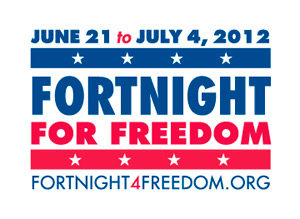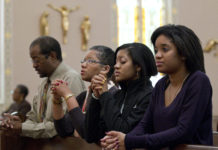People sometimes ask why the U.S. Catholic bishops are making such a fuss about religious freedom these days. After all, some say, churches are not being bombed and people are not being jailed just because they profess a particular faith.
 Religious persecution has many forms. There are violent, upfront ways to deny people their God-given right to religious freedom. And there are subtle, veiled ones to eventually accomplish a similar end. While one would hope we never get to the extremes of the first one, the second is no less real or dangerous—precisely because it is not as easy to identify.
Religious persecution has many forms. There are violent, upfront ways to deny people their God-given right to religious freedom. And there are subtle, veiled ones to eventually accomplish a similar end. While one would hope we never get to the extremes of the first one, the second is no less real or dangerous—precisely because it is not as easy to identify.
The first Amendment of the U.S. Bill of Rights states: “Congress shall make no law respecting an establishment of religion, or prohibiting the free exercise thereof; or abridging the freedom of speech or of the press; or the right of the people to peaceably assemble and to petition the Government for a redress of grievances.”
They are the very first freedoms enumerated in the Bill of Rights for a reason: they are all foundational pillars of the U.S. democracy. They are also the very first rights authoritarian regimes of every color limit or take away from their citizens, for they “interfere” with the uniform imposition of ideologies. Sadly, whether it is from a right-wing dictatorship or a communist regime, in Latin America and Spain we’ve had our share of political experiments that attest to this.

Religious freedom is more than freedom of worship. It goes beyond protecting our ability to attend Mass or a religious service. It guarantees citizens of all faiths, or none whatsoever, the right to contribute to our common life. We Catholics and other religious people come to the table with what we are and what we have. We put our beliefs, values and structures at the service of the common good, because our faith demands that we do so.
We have the right and duty to contribute to society. The Church invests in the common good, for instance, by establishing and running schools, hospitals, universities, charities and social services. Our government and society have long relied on them for help and taken advantage of the vast network that churches and religious institutions provide to aid people in need and to help form good citizens.
But when we are told we’ve got to stop being who we are, to put aside our beliefs, or plainly go against our conscience in order to be allowed to contribute to the common good, there is not much “freedom” involved.
In 1809, Thomas Jefferson wrote that “No provision in our Constitution ought to be dearer to man than that which protects the rights of conscience against the enterprises of civil authority” (Letter to New London Methodist). So when the government, instead of the religious institution, arrogates to itself the power to decide who is sufficiently religious to be considered a religious institution or when religious institutions are disqualified from a government contract based on religious belief, something has gone terribly wrong with the delicate balance our Founding Fathers sought.
The Fortnight for Freedom, July 21-July 4, called by the U.S. Conference of Catholic Bishops, is an opportunity to learn more about religious liberty, what it is, what’s at stake if we lose it and why religious bodies of every kind are making such a fuss about it.
On the Fourth of July some churches plan to ring their bells in conjunction with this initiative. So come Independence Day, let freedom of religion ring and let every person of faith in this country reclaim his and her God-given right to a religious belief or none at all and to act and live accordingly.
— By Mar Muñoz-Visoso, executive director of the Secretariat of Cultural Diversity in the Church at the United States Conference of Catholic Bishops.




![[VIDEO] Make Sunday feel like Sunday again](https://www.catholicsun.org/wp-content/uploads/2021/04/2021-YOUTUBE-BISHOP-MESSAGE-THUMBNAIL-ENGLISH-218x150.png)

